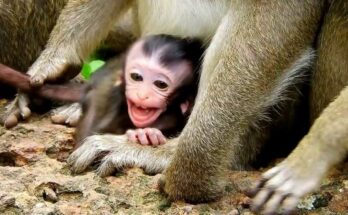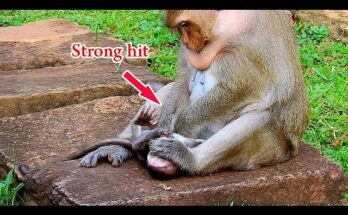oorest Newborn Baby Monkey After Successful Born Mom Less Care With Hug
In the deep green canopy of the jungle, a new life has just begun. A newborn monkey, small and fragile, lies in the arms of his mother. His tiny fingers curl instinctively, his eyes only half-open to the bright world around him. He is one of the most vulnerable creatures in the forest, utterly dependent on his mother for warmth, safety, and nourishment. But unlike most infants in the troop, this baby’s first days of life are marked not by tenderness, but by neglect.
The mother, though she has successfully given birth, offers little of the care most newborns receive. She allows the infant to cling but rarely pulls him close. Her arms, which should wrap him in constant comfort, stay distant. While other mothers groom their babies lovingly and hold them tight to their chests, this mother shows little patience for the tiny creature she has brought into the world.
For a newborn monkey, the early hours and days are critical. Without constant hugging and body warmth, a baby risks both physical weakness and emotional distress. In the troop, the contrast is striking. Nearby mothers cradle their infants closely, offering them security and milk whenever they cry. Their babies grow calm and safe, learning trust from the very beginning. But for this little one, cries often go unanswered.
The jungle itself carries on in rhythm. The troop forages for fruits, tender leaves, and insects. Youngsters play, leaping across branches, while dominant males keep watch. In this bustle of life, the newborn struggles to find his place. He clings weakly to his mother’s fur as she moves through the trees, his body pressed flat against her back rather than nestled against her chest. His hunger grows more intense with each passing hour.
Sometimes, when his cries pierce the air, his mother briefly allows him to nurse. But the feeding is short and impatient. She pushes him away quickly, turning her attention back to the troop. The lack of extended hugs and grooming leaves him restless. His tiny body trembles not only from hunger, but also from the absence of gentle touch—an absence that every infant instinctively longs for.
From a documentary perspective, such behavior is not uncommon in the wild. Not all mothers are equally nurturing. Some, stressed by troop dynamics or scarce resources, invest less in their newborns. Others may simply lack the maternal instinct as strongly as their peers. For the infant, however, the consequences are severe. His survival depends on adapting quickly—learning to cling tighter, to reach for food sooner, and to endure the loneliness that comes with his mother’s distance.
As the sun sets, painting the forest in shades of gold and shadow, the newborn curls up again against his mother. Though her arms do not wrap him in a warm embrace, his instinct to cling remains unbroken. He is small, he is poor in comfort, but he is alive. And in the wild jungle, that fragile spark of life is enough to give hope for tomorrow.


